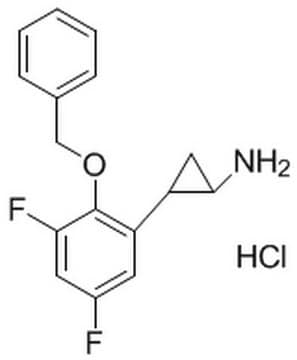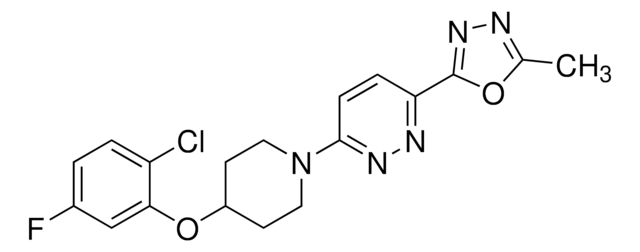SML1072
GSK-LSD1
≥98% (HPLC)
Synonyma:
GSK-LSD1 (trans-racemic) dihydrochloride, rel- N-[(1R,2S)-2-Phenylcyclopropyl]-4-Piperidinamine hydrochloride (1:2)
About This Item
Doporučené produkty
Quality Level
assay
≥98% (HPLC)
form
powder
color
white to beige
solubility
H2O: 20 mg/mL, clear
storage temp.
2-8°C
SMILES string
C1(N[C@@H]2C[C@H]2C3=CC=CC=C3)CCNCC1
InChI
1S/C14H20N2/c1-2-4-11(5-3-1)13-10-14(13)16-12-6-8-15-9-7-12/h1-5,12-16H,6-10H2/t13-,14+/m0/s1
Inchi Key
BASFYRLYJAZPPL-UONOGXRCSA-N
Související kategorie
Application
Biochem/physiol Actions
To learn about other SGC chemical probes for epigenetic targets, visit sigma.com/sgc
Features and Benefits
related product
Storage Class
11 - Combustible Solids
wgk_germany
WGK 3
flash_point_f
Not applicable
flash_point_c
Not applicable
Osvědčení o analýze (COA)
Vyhledejte osvědčení Osvědčení o analýze (COA) zadáním čísla šarže/dávky těchto produktů. Čísla šarže a dávky lze nalézt na štítku produktu za slovy „Lot“ nebo „Batch“.
Již tento produkt vlastníte?
Dokumenty související s produkty, které jste v minulosti zakoupili, byly za účelem usnadnění shromážděny ve vaší Knihovně dokumentů.
Zákazníci si také prohlíželi
Sortimentní položky
We offer a variety of small molecule research tools, such as transcription factor modulators, inhibitors of chromatin modifying enzymes, and agonists/antagonists for target identification and validation in gene regulation research; a selection of these research tools is shown below.
Náš tým vědeckých pracovníků má zkušenosti ve všech oblastech výzkumu, včetně přírodních věd, materiálových věd, chemické syntézy, chromatografie, analytiky a mnoha dalších..
Obraťte se na technický servis.














